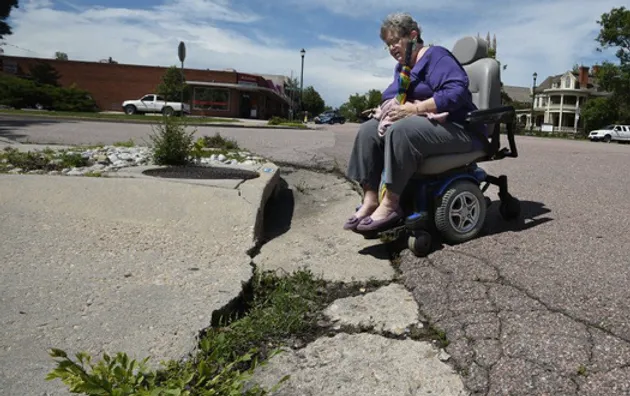
Colorado Springs Pledges 15,000 curb cuts for wheelchairs in next 15 years: So What's the Problem?
3/22/19: In a legal settlement announced today, the City of Colorado Springs explains how disability activists backed by top attorneys are dismissing their federal discrimination suits now that city leaders have finally pledged to install 15,000 sidewalk curb cuts all across town, at a cost of $200 or a little more each.
If we assume it really takes 15 years for the City to complete work, or that the City actually keeps its promises, 2034 seems a little long time to wait for these most basic sidewalk accessibility modifications so commonplace across our nation since the early 1990's.
So, just how exactly does the City justify its forty-plus year delay? Not surprisingly, leaders are mum on the topic.
Under 1990's groundbreaking Americans With Disabilities Act, signed into law by then-President George H. W. Bush, public and private entities across the nation were suddenly compelled to put out the Welcome Mat for handicapped Americans unable to otherwise independently navigate our society without the physical modifications and mandates identified under the expansive new law.
Twenty-nine years later, 2018 was an ugly year for the City when disability activists finally said enough is enough. Sued twice in just six months by a pair nationally-respected disability rights attorneys, the City was finally called to appear before a judge, where opposing counsel let leaders introduced the very expensive consequences ahead if the city continued to break federal law without immediate and aggressive changes.
The City wants voters to believe that its unapologetic non-compliance was an obvious byproduct of the sheer expense of wheelchair ramps. After all, 15,000 $200 ramps could ring in at over $3 million. Broken down annually over the full fifteen-year project completion goal, this translates into a $200,000 liability annually in a place where Mayor John Suthers pitched a 2019 general fund budget totaling an astonishing $302.1 million, including an increase of about $15 million directed toward increased wages for critical city workers, including police, firefighters and civilian employees.
In this type of spending environment, the City has run out of time and excuses to justify further delays to installation of the curb cuts. Recent history even suggests that by spending $200,000 a year on installation, taxpayers will actually be saving cash. After all, just late last year, the City forked out $300,000 to disability compliance experts tasked with examining the quality of City's ADA compliance. With additional six figures in spending commitments arising out of the pair of
aforementioned lawsuits.
We'll be watching how this unfolds in coming months. To anyone impacted by Colorado Springs inaccessible public infrastructure, send us a line. As a firm committed to protecting the rights of Colorado's disabled residents and their families, we are happy to speak with you.
